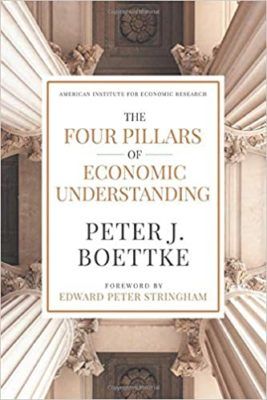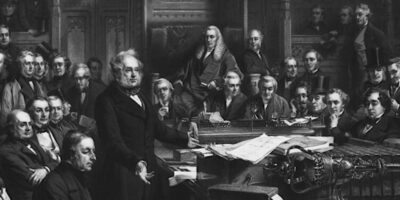Economic Basic: Trade Is Mutually Beneficial
The great economist Frank Knight once stated simply: “An exchange is an exchange is an exchange; it is voluntary and mutually beneficial.” This is perhaps the first lesson most students learn in economics.
Yet so much of our political and popular rhetoric is based on the idea that trade is a zero-sum game: one party wins, the other party loses. The man who currently occupies the office of the presidency, Donald Trump, has long championed this idea, and the idea that he had the skill and foresight to always be on the winning side of deals. Just read his The Art of the Deal, and you will see that nothing he is currently saying about trade is new: he has been spouting his view about winning and losing through trade for decades.
Some very smart economists have convinced themselves that in trade negotiations Trump is merely playing a strategy of hard negotiating that one might depict as the cunning of reason in game theory. But as the old phrase went, “Only Nixon could go to China,” and so perhaps only a die-hard protectionist could get zero-tariff policy agreements.
Perhaps. But I don’t buy it. I am not sure any politician actually reveals a deep understanding of economics, because the logic of the situation in politics is more often than not in conflict with sound economics. To put this simply, good politics — politics that ensures electoral success — concentrates easily identifiable benefits on the well-organized and well-informed special interest groups in the short run, and disperses the costs on the unorganized and ill-informed mass of citizens in the long run. Good economics does the opposite and basically concentrates costs on the decision-makers but diffuses benefits to the consumers. So good economics and good politics clash.
As a result, as Thomas Sowell likes to say, the first rule of economics is that we live in a world of scarcity and thus we must make trade-offs; the first rule of politics is to deny scarcity, and I would add, deny the mutually beneficial aspect of trade.
Given all this talk about the zero-sum nature of trade, and the “winners” and “losers” in trade deals, it is critically important to have works available that dig into these issues. Earlier this year, the great economist Doug Irwin published a major scholarly work on trade that should be read by any serious student in the policy sciences, Clashing Over Commerce (University of Chicago Press, 2017). Irwin’s book is a scholarly tome and digs deep into the history of U.S. trade agreements and is grounded in the analytics of modern economic theory. It is a book for serious students.
Though we professor types all would like the general public to read and learn from our work, we cannot reasonably expect it to have that access to our presentations. So there is a constant need for the wisdom from economic thinking on complex issues in trade, monetary policy, fiscal policy, and regulation to be distilled into more accessible forms.
I want to suggest that Pierre Lemieux has written such a book dealing with trade entitled What’s Wrong With Protectionism?: Answering Common Objections to Free Trade (Rowman & Littlefield, 2018). The work consists of eight core chapters answering objections to free trade, and in so doing dispels many common fears that have been perpetuated by politicians and special interest groups. Does competition from low-cost foreign producers mean U.S. firms cannot compete? Does free trade harm the U.S. economy? Are trade deficits detrimental? Has free trade destroyed manufacturing and factory work in general in the United States? Does free trade destroy jobs? Does free trade lower wages? Ultimately, is free trade unfair?
Lemieux carefully and thoroughly debunks the fear-mongering myths of free trade. He reasons based on the economic way of thinking, and he marshals evidence to counter the impressionistic slogans of protectionists.
Deirdre McCloskey likes to remind us that you cannot answer empirical questions philosophically. But so many long to do so. Reason and evidence sometimes don’t win the day. Instead a certain aesthetic picture captures the minds of the public, and politicians and special interest groups can manipulate that popular opinion to their advantage in the voting booth and in their wallets.
As Don Boudreaux and Dan Griswold write to conclude their introduction: “Now, more than ever, we need to remind ourselves of the economic as well as the ethical reasons why our nation has pursued a path of trade liberalization since the end of World War II. Pierre Lemieux’s book is just the timely and pithy reminder that we need at this historic moment.”
As Lemieux himself concludes his book, “More free trade is needed, not less.” Let’s hope this primer on free trade gets a wide hearing in the marketplace of ideas.













